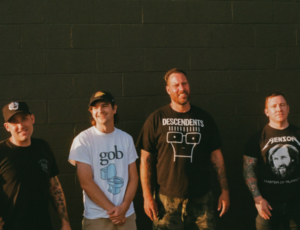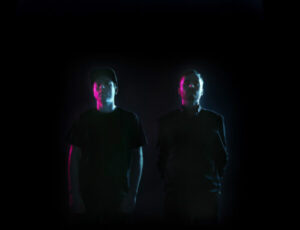
“Nu metal” has been a dirty word nearly from its coinage. Despite the fact that it was a massively lucrative wave moving through the late-1990s alternative music world, bands associated with it such as Korn and Slipknot generally took a defensive stance against being labeled according to the term. Even those less apologetic nu metal bands eventually changed their sound, actively disowning the movement which had defined them in people’s minds.
Sacramento, CA-based band
Deftones was in the former camp in the 90s, outrightly rejecting the term. Lead singer Chino Moreno considered nu metal to be a passing phase with which they happened to be associated, and which he believed he and the band would be able to transcend.
A grounding in the fusion of metal and urban music still marks their distinctive style, yet they have not been stunted in their maturation by the youth-focused nature of either of those camps. In a sense, they have done better than to transcend nu metal: they have learned from it and improved upon it, moving past the bad and staying connected to the good. While their most distinguished album,
White Pony, was released in 2000 at the height of nu metal’s popularity, further developments in their style have definitely been positive.
The most significant change in the life of the band came in 2008, when a serious car accident left long-time bassist Chi Cheng in a minimally conscious state due to brain damage. The band had been in the studio working on an as-yet unreleased project known as
Eros, but the accident forced the band to see itself and its work in a different light. Their previous album, 2006’s
Saturday Night Wrist, had seen band relationships break down, especially concerning Chino, who had been spending a lot of time on other projects, as well as descending into addiction and overall health problems.
After Cheng’s accident, Chino resolved to clean up, take care of his health, and get the band back on track. Deftones got back into the studio with bassist Sergio Vega (Quicksand) and new producer Nick Raskulinecz (Foo Fighters, Rush, Marilyn Manson, Stone Sour, etc.) and attacked the task with new songs and new purpose. The result was 2010’s
Diamond Eyes, an album displaying a sense of vitality not seen from the band for nearly a decade. It was heavier, tighter, more melodic, and infinitely more focused than
Saturday Night Wrist, showing the biggest stylistic shift in the band’s career since
White Pony.
This year’s offering from Detones,
Koi No Yokan, is a natural progression from
Diamond Eyes. Carpenter has kept the 8-string guitars in the mix, and continued with the ever-heavier, riff-based mindset he adopted with Raskulinecz’s encouragement. The guitar, bass, and drums absolutely are the core driving force of this record, locking together much more tightly than can be heard on their earlier works. The track,
“Swerve City”, could never have happened on
Around The Fur, or on even the 2003 self-titled album. The band is enjoying a new level of cohesion, and the result is, plainly speaking, better music.
Another feature from
Diamond Eyes which reoccurs here is the ambient trip-hop style on certain songs, borrowed from Chino’s side project, Team Sleep. This is a wise stylistic choice, allowing the band to evoke something different than the angst of their more aggressive material. On these songs (
“Entombed” and
“Tempest”, for instance), the band engages in some of their most interesting musical explorations to date, making optimal use of keyboardist/DJ Frank Delgado’s talents. In addition, Chino in particular does some of his best vocal work on these tracks. I consider him one of the best vocalists in alternative music right now: his aggression is always supported by conviction and passion, and controlled by his remarkable talent. On the other hand, he is capable of incredible tenderness in his singing, possessing a seductive, almost feminine tone.
Bringing all these elements together, Raskulinecz’s production on this record is pristine yet organic, and captures the band’s sound faithfully. The new songs feel similar to those on
Diamond Eyes, which I suppose is appropriate and welcome: this is the “new Deftones”. And of course, melody for Chino has always been very free and loosely structured. Their music is more experiential than communicative, opting for a focus on texture and a fluid tension-and-release cycle. These are the main strengths of
Koi No Yokan, and for that, the lack of ingeniously original songwriting can be more than forgiven.
You won’t find anything groundbreaking or revelatory in
Koi No Yokan… or will you? The title is a Japanese expression, referring to a sense upon meeting a person that you will eventually fall in love with. My own experience of Deftones’ music (and I imagine that I am not alone in this) has caused me to live in the world of elusive intuitions. In that sense, it has potential to become the soundtrack to a part of your life.
This music defies deep technical or even conceptual analysis. Leave behind rationality and concrete realism, and experience it for yourself. It might just change your life in a way you likewise can’t describe.
 “Nu metal” has been a dirty word nearly from its coinage. Despite the fact that it was a massively lucrative wave moving through the late-1990s alternative music world, bands associated with it such as Korn and Slipknot generally took a defensive stance against being labeled according to the term. Even those less apologetic nu metal bands eventually changed their sound, actively disowning the movement which had defined them in people’s minds.
Sacramento, CA-based band Deftones was in the former camp in the 90s, outrightly rejecting the term. Lead singer Chino Moreno considered nu metal to be a passing phase with which they happened to be associated, and which he believed he and the band would be able to transcend.
A grounding in the fusion of metal and urban music still marks their distinctive style, yet they have not been stunted in their maturation by the youth-focused nature of either of those camps. In a sense, they have done better than to transcend nu metal: they have learned from it and improved upon it, moving past the bad and staying connected to the good. While their most distinguished album, White Pony, was released in 2000 at the height of nu metal’s popularity, further developments in their style have definitely been positive.
The most significant change in the life of the band came in 2008, when a serious car accident left long-time bassist Chi Cheng in a minimally conscious state due to brain damage. The band had been in the studio working on an as-yet unreleased project known as Eros, but the accident forced the band to see itself and its work in a different light. Their previous album, 2006’s Saturday Night Wrist, had seen band relationships break down, especially concerning Chino, who had been spending a lot of time on other projects, as well as descending into addiction and overall health problems.
After Cheng’s accident, Chino resolved to clean up, take care of his health, and get the band back on track. Deftones got back into the studio with bassist Sergio Vega (Quicksand) and new producer Nick Raskulinecz (Foo Fighters, Rush, Marilyn Manson, Stone Sour, etc.) and attacked the task with new songs and new purpose. The result was 2010’s Diamond Eyes, an album displaying a sense of vitality not seen from the band for nearly a decade. It was heavier, tighter, more melodic, and infinitely more focused than Saturday Night Wrist, showing the biggest stylistic shift in the band’s career since White Pony.
This year’s offering from Detones, Koi No Yokan, is a natural progression from Diamond Eyes. Carpenter has kept the 8-string guitars in the mix, and continued with the ever-heavier, riff-based mindset he adopted with Raskulinecz’s encouragement. The guitar, bass, and drums absolutely are the core driving force of this record, locking together much more tightly than can be heard on their earlier works. The track, “Swerve City”, could never have happened on Around The Fur, or on even the 2003 self-titled album. The band is enjoying a new level of cohesion, and the result is, plainly speaking, better music.
Another feature from Diamond Eyes which reoccurs here is the ambient trip-hop style on certain songs, borrowed from Chino’s side project, Team Sleep. This is a wise stylistic choice, allowing the band to evoke something different than the angst of their more aggressive material. On these songs (“Entombed” and “Tempest”, for instance), the band engages in some of their most interesting musical explorations to date, making optimal use of keyboardist/DJ Frank Delgado’s talents. In addition, Chino in particular does some of his best vocal work on these tracks. I consider him one of the best vocalists in alternative music right now: his aggression is always supported by conviction and passion, and controlled by his remarkable talent. On the other hand, he is capable of incredible tenderness in his singing, possessing a seductive, almost feminine tone.
Bringing all these elements together, Raskulinecz’s production on this record is pristine yet organic, and captures the band’s sound faithfully. The new songs feel similar to those on Diamond Eyes, which I suppose is appropriate and welcome: this is the “new Deftones”. And of course, melody for Chino has always been very free and loosely structured. Their music is more experiential than communicative, opting for a focus on texture and a fluid tension-and-release cycle. These are the main strengths of Koi No Yokan, and for that, the lack of ingeniously original songwriting can be more than forgiven.
You won’t find anything groundbreaking or revelatory in Koi No Yokan… or will you? The title is a Japanese expression, referring to a sense upon meeting a person that you will eventually fall in love with. My own experience of Deftones’ music (and I imagine that I am not alone in this) has caused me to live in the world of elusive intuitions. In that sense, it has potential to become the soundtrack to a part of your life.
This music defies deep technical or even conceptual analysis. Leave behind rationality and concrete realism, and experience it for yourself. It might just change your life in a way you likewise can’t describe.
“Nu metal” has been a dirty word nearly from its coinage. Despite the fact that it was a massively lucrative wave moving through the late-1990s alternative music world, bands associated with it such as Korn and Slipknot generally took a defensive stance against being labeled according to the term. Even those less apologetic nu metal bands eventually changed their sound, actively disowning the movement which had defined them in people’s minds.
Sacramento, CA-based band Deftones was in the former camp in the 90s, outrightly rejecting the term. Lead singer Chino Moreno considered nu metal to be a passing phase with which they happened to be associated, and which he believed he and the band would be able to transcend.
A grounding in the fusion of metal and urban music still marks their distinctive style, yet they have not been stunted in their maturation by the youth-focused nature of either of those camps. In a sense, they have done better than to transcend nu metal: they have learned from it and improved upon it, moving past the bad and staying connected to the good. While their most distinguished album, White Pony, was released in 2000 at the height of nu metal’s popularity, further developments in their style have definitely been positive.
The most significant change in the life of the band came in 2008, when a serious car accident left long-time bassist Chi Cheng in a minimally conscious state due to brain damage. The band had been in the studio working on an as-yet unreleased project known as Eros, but the accident forced the band to see itself and its work in a different light. Their previous album, 2006’s Saturday Night Wrist, had seen band relationships break down, especially concerning Chino, who had been spending a lot of time on other projects, as well as descending into addiction and overall health problems.
After Cheng’s accident, Chino resolved to clean up, take care of his health, and get the band back on track. Deftones got back into the studio with bassist Sergio Vega (Quicksand) and new producer Nick Raskulinecz (Foo Fighters, Rush, Marilyn Manson, Stone Sour, etc.) and attacked the task with new songs and new purpose. The result was 2010’s Diamond Eyes, an album displaying a sense of vitality not seen from the band for nearly a decade. It was heavier, tighter, more melodic, and infinitely more focused than Saturday Night Wrist, showing the biggest stylistic shift in the band’s career since White Pony.
This year’s offering from Detones, Koi No Yokan, is a natural progression from Diamond Eyes. Carpenter has kept the 8-string guitars in the mix, and continued with the ever-heavier, riff-based mindset he adopted with Raskulinecz’s encouragement. The guitar, bass, and drums absolutely are the core driving force of this record, locking together much more tightly than can be heard on their earlier works. The track, “Swerve City”, could never have happened on Around The Fur, or on even the 2003 self-titled album. The band is enjoying a new level of cohesion, and the result is, plainly speaking, better music.
Another feature from Diamond Eyes which reoccurs here is the ambient trip-hop style on certain songs, borrowed from Chino’s side project, Team Sleep. This is a wise stylistic choice, allowing the band to evoke something different than the angst of their more aggressive material. On these songs (“Entombed” and “Tempest”, for instance), the band engages in some of their most interesting musical explorations to date, making optimal use of keyboardist/DJ Frank Delgado’s talents. In addition, Chino in particular does some of his best vocal work on these tracks. I consider him one of the best vocalists in alternative music right now: his aggression is always supported by conviction and passion, and controlled by his remarkable talent. On the other hand, he is capable of incredible tenderness in his singing, possessing a seductive, almost feminine tone.
Bringing all these elements together, Raskulinecz’s production on this record is pristine yet organic, and captures the band’s sound faithfully. The new songs feel similar to those on Diamond Eyes, which I suppose is appropriate and welcome: this is the “new Deftones”. And of course, melody for Chino has always been very free and loosely structured. Their music is more experiential than communicative, opting for a focus on texture and a fluid tension-and-release cycle. These are the main strengths of Koi No Yokan, and for that, the lack of ingeniously original songwriting can be more than forgiven.
You won’t find anything groundbreaking or revelatory in Koi No Yokan… or will you? The title is a Japanese expression, referring to a sense upon meeting a person that you will eventually fall in love with. My own experience of Deftones’ music (and I imagine that I am not alone in this) has caused me to live in the world of elusive intuitions. In that sense, it has potential to become the soundtrack to a part of your life.
This music defies deep technical or even conceptual analysis. Leave behind rationality and concrete realism, and experience it for yourself. It might just change your life in a way you likewise can’t describe. 









